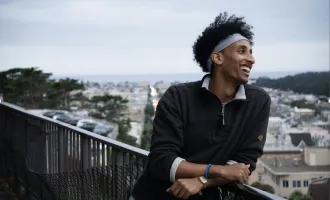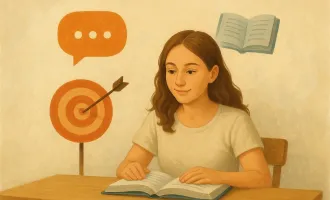
My Coming Out Story
One by one, from a lone chair atop a brightly lit stage, students and staff opened up about their journeys of coming out to the world.
On Oct. 12, members of UCSF’s LGBTQ community came together for the 2nd Annual Coming Out Monologues, where brave voices volunteered to tell their stories.
Hot on the heels of National Coming Out Day, the Monologues represented a night of unity for the queer community, where we could be vulnerable and discover how different yet relatable many of our experiences are.
Between inspirational stories, videos of the OUTlist played where, similar to this event, members of the UCSF queer community spoke on their lived-in experiences (check it out!).
Even after the official list of participants was complete, our host for the night, Klint Jaramillo, let the mic rest on the chair for last-minute volunteers. Inspired by the previous storytellers, many more stepped up to lay their experiences bare.
Coming out is almost never an easy task. A common thread that emerged was that one of the most difficult steps is coming out to yourself – to accept reality and what it means for life ahead.
Some people knew from an early age while others slowly grew into the realization, but there’s a difference between knowing and accepting.
A few storytellers recalled bargaining or playing mind games with their sexuality, attempting to force themselves to consider all of the possibilities before resting on the foregone conclusion.
“There’s something about making it tangible that’s frightening,” one storyteller said. To think it is one thing, but to say it makes it real to the world.
The next difficult task is choosing who you want to see on the other side of the closet once you open it.
Many begin with telling their good friends or siblings, slowly working their way up to what was often hardest – the parents. There were many different approaches, ranging from classics like The Incredibly Formal Informal Dinner or The Sit-Down to the more subtle millennial “interested in” Facebook change.
A common phrase after coming out to one family member was “Don’t tell your father/mother.”
With close family, reactions spanned the whole spectrum. Many knew already and “spoiled the surprise”, some were not accepting, and many simply chose not to talk about it for days, months, and even years.
Despite the range of reactions, the storytellers often emphasized that people can and do come around. Whether it was from the passage of time, persistent unapologetic queerness, or voluntary education sessions, even previously bigoted parents were able to grow to be more understanding and accepting.
From there, coming out almost always had a snowball effect. Like ripping a band-aid off, after the initial pain each subsequent “coming out” was made easier.
To honor that thought, I will tell my story here:
Feeling one way or another about men never really hit me until high school. Up until then I had occasional “crushes” on girls, probably because media told me I should. But, suddenly, men with muscles started to arouse me when nothing else would.
It was hard to wrestle with those feelings because I could still find girls “pretty” and imagine myself romantically involved with them.
I believed that to be gay you had to be neutral or even negative towards attraction to women, the same way my straight colleagues absolutely refused to say whether one guy was better looking than another.
I kept coming back to men when I thought long enough, yet tried to keep the “women” option tucked in a drawer as a faint possibility.
I thought that being gay would make life hard, harder than trying to convince myself that I was still be attracted to women. I knew of the slurs, the harassment, and the general stigma about the gay lifestyle , and I didn’t want to live that.
Of course I indulged the more primal feelings in private, occasionally stealing away the raunchier issues of Mom’s Cosmopolitan magazine or using the vastness of the 00’s internet.
I remember one incident where my brother walked in on me watching men’s oil wrestling. He wordlessly came in and out to grab some vitamins off my desk, and I closed the browser windows as fast as I could.
After I heard the door shut, the next thing I knew was the world shuddering back to life around me and my drool-wet keyboard pressing into my face.
I fainted for the first time in my life.
I wrote a long letter to him the next day describing that I was in my exploratory phase of being a teenager. I lied that I just happened to come across that link, emphasizing that the men were “not naked.” I slipped it under his door and we never spoke of it.
I accepted that I was gay in college, and I could do nothing to change that. But, I still couldn’t shake the dread of a more difficult life.
There was not a large LGBTQ community on campus, and being in a rural area in the South, my college still attracted a strong conservative presence. On a visit there, my out-and-proud friend from high school was called a “fag” by another student while getting coffee.
I decided that because it would be harder to pursue relationships, it didn’t matter if I was out or not. So, I chose to stay in the closet those 4 years.
Coming to San Francisco I told myself that if there was any place to do it, this would be the place. I made a promise that I wouldn’t fake entertaining being with a woman, and that I would at the very least use the gender-neutral “significant other” when talking about hypothetical relationships.
I was waiting for someone to ask me up front if I was gay and pull the band-aid off for me, but that day never came.
I spent my first year essentially peeking out of the closet waiting for someone to see me. Part of me felt more comfortable staying in – early on I overheard a UCSF student gossiping about everyone who was gay at UCSF, who they saw on Grindr, and who was sleeping with who. I didn’t want to voluntarily thrust myself into a toxic culture and become part of the gossip.
And yet, the second December in SF I reached my limit. I wanted to pursue relationships and intimacy. I wanted to let go of that sunken feeling in my stomach and embrace queer culture, something I was realizing more and more to be incredibly rich and diverse. I wanted to live feeling whole.
I finally realized that it was harder to live as a broken man than a gay one.
Funny enough, the easiest part of my coming out story was coming out. I knew that my immediate family and close friends would already support me. I wanted to avoid any theatrics, so one by one, I came out through text. Some knew, most didn’t; many thought I was just asexual. And as I expected, I was received with love. I know that’s a privilege.
Coming out has led to me being more unapologetic about who I am.
When I first started dating I was still extremely self-conscious about my neurological disease that makes me walk differently. I would always ask up-front if it was okay that I walked funny. Now I don’t care, because I’ve continued to learn to accept and love every facet of myself. I take my shirt off more. I’m more open regarding sex and sexuality. I wear what I want. I appreciate queer people as a community and not just as a dating pool. I understand what it means to live my truth.
I share more and steer into vulnerability, because I know that you have to keep your doors open in order to walk through them.
Coming out can be a liberating experience, but everyone has their own path towards reaching that point. It’s important to respect that, and also to acknowledge that we shouldn’t feel shamed or pressured about coming out.
For those of us that make that decision, there will always be a supportive community on the other side if you know where to look. You are not alone.


